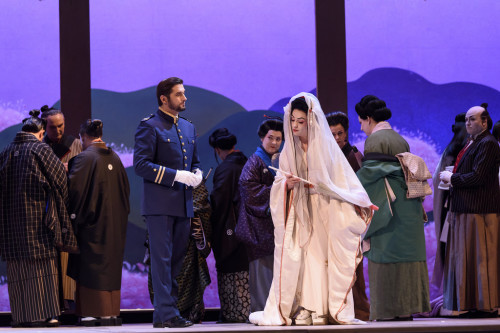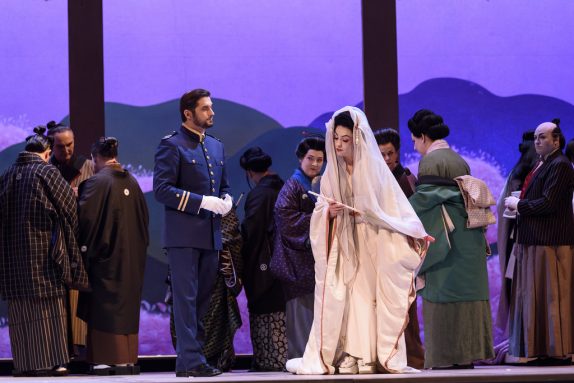 United Kingdom Puccini, Madama Butterfly: Soloists, Chorus and Orchestra of the Royal Opera House / Sir Antonio Pappano (conductor). Directed for the screen by Matthew Woodward and broadcast live to Cineworld Basildon, Essex, 30.3.2017. (JPr)
United Kingdom Puccini, Madama Butterfly: Soloists, Chorus and Orchestra of the Royal Opera House / Sir Antonio Pappano (conductor). Directed for the screen by Matthew Woodward and broadcast live to Cineworld Basildon, Essex, 30.3.2017. (JPr)

Cast included:
Cio-Cio-San (‘Madama Butterfly’) – Ermonela Jaho
B.F. Pinkerton – Marcelo Puente
Suzuki – Elizabeth DeShong
Goro – Carlo Bosi
Sharpless – Scott Hendricks
The Bonze – Jeremy White
Prince Yamadori – Yuriy Yurchuk
Kate Pinkerton – Emily Edmonds
Imperial Commissioner – Gyula Nagy
Production:
Directors – Moshe Leiser and Patrice Caurier
Set Designer – Christian Fenouillat
Costume Designer – Agostino Cavalca
Lighting Designer – Christophe Forey
The PC police have frequently set their sights on Madama Butterfly, damning it because of its racial stereotypes. This of course is true; equally worrying is its hint of paedophilia (at one point Butterfly sings something like, ‘love me just a little, like you would a child’) and the ‘celebration’ – however ironic Puccini might have been – of the greatness of America, especially now when we must consider it is Trump’s America! Unfortunately we are stuck in a time warp, the work is what it is and of the time it was written. Puccini is not allowed the revisionism available say to Clint Eastwood, some years ago, in his masterpiece Letters from Iwo Jima, that together with its equally excellent companion film Flags of Our Fathers can present a conflict between America and Japan from both viewpoints. Of course, nothing like Madama Butterfly would be composed and staged today. There must be intellectual common sense and great minds possibly should find other things to bother themselves with, though the doubts linger.
At the time of writing, Scarlett Johansson has been plunged into a Twitter storm over her casting in the forthcoming Hollywood remake of the classic Japanese anime Ghost in the Shell instead of someone who is Asian. This is the fifth revival of Patrice Caurier and Moshe Leiser’s 2003 production in its ‘traditional’ designs from Christian Fenouillat (sets) and Agostino Cavalca (costumes). As far as I could see, no one on stage appeared to have the ‘appropriate ancestry’ and, of course, this would probably not be allowed in straight theatre. During the evening, I pondered on whether we would see the musical Miss Saigon – which of course owes much to Madama Butterfly – with a non-Asian in the lead, undoubtedly not.
Enough of this, what about the show? It must have helped that Patrice Caurier and Moshe Leiser had been present to oversee this revival of their admirably unintrusive production. The central feature of any ‘traditional’ Madama Butterfly must be a Japanese home with thin paper walls consisting of sliding panels. This is either represented fully or hinted at. Here we have all the ‘action’ contained with three walls with panels at the back that for novelty mostly go up and down rather that back and forth. Through the lifting panels we see Nagasaki harbour, hills with cherry blossom, a neglected garden, a moonlight scene with an array of stars above when appropriate, but that is about all we have to look at. It all seems a reminiscence of a historical happening; is quite evocative, and worked well on the screen. As a slight digression, I must praise Matthew Woodward’s camerawork which enveloped the cinema audience in the unfolding tragedy.
All the close-ups and the austerity of the setting throws all the work on to the principals and the music. In one of the backstage videos we saw, Ermonela Jaho who was singing Butterfly, suggested if those performing in Madama Butterfly believe in what they are doing ‘then the public will too’. To see her working with Antonio Pappano on ‘Un bel di’ was deeply fascinating and I recommend the Royal Opera House’s Digital Programmes for their cinema broadcasts where all these films – and much else – can be found.
Right from the start it was clear indeed that everyone involved did ‘believe’ and Matthew Woodward’s focus on the faces only worked because of that. There is some restraint in the passion during Act I, despite Pinkerton’s lust for the young Butterfly being obvious and more than a little disturbing. For that infamous phrase about being loved like a child, Butterfly sensuously reveals a bare shoulder and Pinkerton’s ardour for her at the end of Act I is depicted by just a loosening of the top button of his tunic as she lies on the floor.
Perhaps mainly through the famous Anthony Minghella production (review here) I have got used to the child, Sorrow, displaying more Japanese features than Western ones hinting at some self-delusion on Butterfly’s part, but again here it was played perfectly straight. Having realised her situation, she commits hara-kiri with her father’s knife while the blindfolded angelic, fair-haired child (a wonderfully po-faced Harry Langton) pitifully waves his small American flag and Pinkerton sings off-stage. His mother rises from the ‘dead’ to flap her arms and hauntingly expire like a ‘real’ Butterfly centre stage before Pinkerton presumably gets there.
Possibly playing older than his years, Scott Hendricks was a sympathetic Sharpless without wiping from my memory others, such as Norman Bailey and Alan Opie who I have seen in this role. Carlo Bosi was excellent as the hand-wringing, wheedling and conniving marriage broker, Goro. The veteran Jeremy White as the Bonze should create more of a frisson when he denounces Butterfly and I missed the sense of dread which should be apparent at this point in Act I. Much better was Yuriy Yurchuk as the dignified and love-struck Prince Yamadori. Elizabeth DeShong was an exceptional Suzuki and with her vibrantly rich tones making the most of even something as small as her Act I evening prayer. This Suzuki is intensely loyal and very fond of Butterfly. I just wondered whether Leiser and Caurier could have made her seem a little more doubtful at the end of Act II about the likelihood of things ending happily now Pinkerton’s ship has been sighted.
Marcelo Puente is making his debut at the Royal Opera House as Pinkerton. Just how far back I go with Butterfly is that my first Pinkerton in the 1970s in Vienna was great Gianni Raimondi. It was he who provided my first benchmark for what the tenore spinto should be – a brilliant top with some volume and a beautiful timbre to the rest of his voice. A slight vibrato hints that Puente’s voice is not yet the finished article, yet his Pinkerton was overall a robustly ringing account of a thankless role. In his demeanour he reminded me very much of Errol Flynn, and anyone familiar with him will know how appropriate that is for Pinkerton. Puente’s build-up to his Act I duet also he showed he is capable of much finesse when necessary.
Ermonela Jaho is undoubtedly a formidable Butterfly; histrionically and vocally she has everything going for her. Exactly as Pappano wanted ‘Un bel di’ began as something like the ‘smoke rising’ from Pinkerton’s ship as it approaches the harbour. Jaho puts herself through the wringer as she evolves from childlike innocence, through infatuation and delusion, to the realisation that she cannot escape her fate. After ‘marrying’ Pinkerton she has renounced her religious faith and lost her family. The opera’s tragic denouement represents the essence of Butterfly as a beautiful, fragile creature, blinded by self-awareness and with her delicate wings seemingly broken by an uncaring man. Whilst not having the character’s fragility absolutely perfectly in Act I, Jaho reaches great emotional heights at the end of the opera.
Classic FM lovers would have been in their element, with a beguiling rendition of the ‘Humming Chorus’ from both chorus and orchestra. (I mentioned Miss Saigon earlier and this was written by Claude-Michel Schönberg and Alain Boublil. They are also responsible for Les Misérables whose anthem ‘Bring Him Home’ pays homage to this serene chorus.) Wonderfully sung it was a meditative interlude with just the right whiff of cherry blossom. This highlighted the sheer perfection of Antonio Pappano’s Puccini. It was an almost unparalleled interpretation in my experience. There was total respect for the theatricality of the piece, restraint and support for his singers, yet full-blooded passion and angst when necessary and Pappano created an intense atmosphere full of tension and drama. As far as I could hear from Cineworld Basildon’s excellent sound, he brought out an impeccable performance from those before him in the pit. I rarely hear that quality of orchestral sound when in the Royal Opera House and the bird calls that greeted the dawn in Act III were very evocative in the large cinema. Pappano’s attention to detail was sublime, and he thoroughly deserves the support he elicited here from the soloists, chorus and orchestra.
In conclusion, a sublime Butterfly that simply proved this might be one of the operas I need a break from seeing for a while. Everything was virtually as good as it could be; I just had a rather cold feeling from the staging and I was not as really involved in Butterfly’s tragic descent as I have been in the past.
Jim Pritchard
